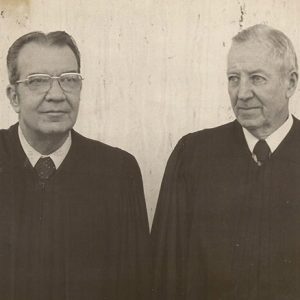calsfoundation@cals.org
George Rose Smith (1911–1992)
George Rose Smith was a prominent twentieth-century lawyer and state Supreme Court justice. He remains the longest-serving Arkansas Supreme Court justice.
George Rose Smith was born on July 26, 1911, in Little Rock (Pulaski County), one of five children of Hay Watson Smith, a minister who served as the pastor of Little Rock’s Second Presbyterian Church for almost forty years, and Jessie Rose Smith. He received his early education in the Little Rock schools before graduating first in his class from Little Rock High School in 1928.
Following graduation, Smith went to Washington and Lee University in Lexington, Virginia. He soon returned home, however, to attend the University of Arkansas (UA) in Fayetteville (Washington County). He graduated first in his class from the University of Arkansas School of Law in 1933. Smith joined what is now the Rose Law Firm; one of the founders of the firm was Smith’s grandfather Uriah M. Rose.
In 1938, Smith married Peg Newton; they had a daughter. Smith interrupted his legal career at the firm to serve in the army during World War II, rising to the rank of major by the end of his three and a half years in uniform.
With the war’s end, Smith resumed his legal practice with the Rose Law Firm. In 1947, Smith wrote an article, “The Current Opinions of the Supreme Court of Arkansas—A Study in Craftsmanship,” criticizing the Arkansas Supreme Court. Published in the Arkansas Law Review, it served as a catalyst for his candidacy for a seat on the court. Although he was a shy man who disliked campaigning, Smith waged an active campaign featuring appearances in every county of the state.
He won election in 1948, taking the oath and assuming his seat on the bench on January 1, 1949. He did not face opposition again until 1962, when another vigorous campaign effort earned him reelection. In a system that called for non-partisan elections every eight years for each seat, with the seats being contested on a staggered basis to ensure some degree of continuity, Smith never faced opposition again after the 1962 election, ultimately serving on the Arkansas Supreme Court from 1949 until 1986.
Smith was thirty-seven years old when he first assumed his seat, and although he was the youngest member of the court, he earned a reputation as a hard-working and dedicated jurist. Over the course of his career, he was instrumental in efforts to streamline the court’s administrative procedures. The author of more than 2,000 opinions over almost four decades, Smith tackled some of the most contentious issues in Arkansas law. In his decision for Laman v. McCord (1968), which established the framework for interpreting the state’s new Freedom of Information Act, Smith wrote, “As a rule, statutes enacted for the public benefit are to be interpreted most favorably to the public.” Later, in Collins v. State (1977), he was a dissenting voice arguing in favor of mandatory appeals in death penalty cases.
Smith was known for his sense of humor as well as a scholarly approach to the law, one further demonstrated through the Arkansas Law Review articles he continued to author. Smith once offered $100 to anyone who could discover a grammatical mistake in any of his written court opinions—a prize that went forever unclaimed—and his efforts exemplified well-written judicial opinions. Indeed, that practice extended even to the traditional fictitious April Fool’s Day opinions that were eagerly anticipated by those in the know—and seriously considered by those who were not. His most famous was probably J. R. Poisson v. Etienne d’Avril (1968).
Smith was passionate about crossword puzzles, not only solving them with impressive facility but also writing them. He sold many to Arkansas newspapers, as well as some to the New York Times, with some of his other submissions reportedly rejected because they were too difficult. In addition, Smith was a talented carpenter and bricklayer.
Smith retired from the Arkansas Supreme Court in 1986. In his final opinion, he left a message for his fellow Arkansans, as the first letter of each sentence in the opinion’s concluding paragraph combined to spell the word “FAREWELL.”
After retirement, Smith and his wife traveled to Europe. After a short illness, Smith died on October 20, 1992. He is buried in Mount Holly Cemetery in Little Rock.
For additional information:
Longan, Patrick Emery. “Professionalism on the Appellate Bench: The Life and Example of Justice George Rose Smith of the Arkansas Supreme Court.” Arkansas Law Review 54, no. 3 (2001): 523–576.
Wright, Robert. Old Seeds in the New Land: History and Reminiscences of the Bar of Arkansas. Fayetteville: University of Arkansas Press, 2001
William H. Pruden III
Ravenscroft School
 Divergent Prosperity and the Arc of Reform, 1968–2022
Divergent Prosperity and the Arc of Reform, 1968–2022 Supreme Court Justices
Supreme Court Justices 




Comments
No comments on this entry yet.